 Leading Blog | Posts by Month |
 Leading Blog | Posts by Month |
01.31.10

LeadershipNow 140: January 2010 Compilation
Posted by Michael McKinney at 11:59 AM
01.29.10

5 Leadership Lessons: How Men and Women Lead Differently
Posted by Michael McKinney at 09:12 AM
01.28.10

What Kind of Leadership Will Work in 2010?The Work Foundation, a British think-tank, released a reaffirming report on the principles of outstanding leadership. They concluded that outstanding leaders do three things:
“Not too many leaders can place a tick by all four of these requirements. Cynical or disillusioned leaders will just add that list to the pile of other leadership theories, which have urged them to become “servant leaders”, “coaches”, “player managers”, and so on. Meanwhile, the disillusionment and dissatisfaction of those who are led grows. And we do not seem much nearer to establishing a clearer idea of what sort of leadership will work in the cynical and confused world of 2010.” He adds this closing anecdote: During the British general election of 1959, the journalist Geoffrey Goodman spent the campaign following the deputy leader of the Labour party, Aneurin Bevan, around the country. He made a record of Bevan’s many memorable speeches. One quotation in particular stands out. Contemplating the world’s increasingly interlinked problems, and the leadership that was on offer to deal with them, Bevan summed up what he saw in these terms: “Smaller and smaller men, strutting across narrower and narrower stages.”In another highlight from the Work Foundation study, they made this observation about the process of becoming an outstanding leader: Becoming an outstanding leader is likely to depend a great deal on maturity, self-awareness and self-development within the job. Some of the outstanding leaders featured in the research did not originally have a people-focused approach, but realised the impact they were having on people and therefore adjusted their style accordingly. They arrived at this point through experience, maturity and reflection. They had a very sophisticated understanding of cause and effect and how their actions can dramatically affect outcomes.I would suggest that “maturity, self-awareness and self-development” will help us to adjust our leadership to the context we now find ourselves working within.
Posted by Michael McKinney at 09:09 AM
01.27.10

Four Steps to Building Loyalty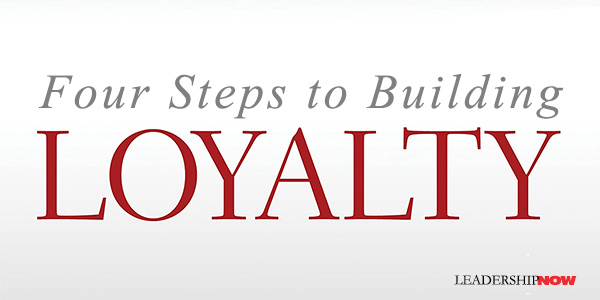
LOYALTY is a critical subject for leaders. As builders of community, we can’t function without it. Successful organizations are built on relationships. Leadership is all about relationships. But how important is modeling loyalty in everything you do? It is hard to talk about sustainability, community, personal responsibility, and relationships without talking about loyalty. Yet we do.Loyalty has become a commodity that we hold or withhold—a tool to vote with—a means to express our discontent on a whim. Abiding commitments are seen as old-fashioned. Impatience, irritability and selfishness all drive the need to look for greener pastures. “In a strange way,” said Jack Valenti, “loyalty is now seen as some kind of character flaw.” In Why Loyalty Matters, authors Timothy Keiningham and Lerzan Aksoy write: The possibility of leaving applies to some degree to our relationships with everyone. Weak friendships, dysfunctional families, bad marriages, intolerant religious institutions, and inept governments all face the prospect of abandonment. And there are indeed times when leaving is the best option. Loyalty is about making commitments to causes, people, and ideas through thick and thin, for better or for worse. It is about service to something greater than ourselves. Keiningham and Aksoy define loyalty as “accepting the bonds that our relationships with others entail, and acting in a way that defends and reinforces the attachment inherent in those relationships.” Loyalty is implicit in all relationships, and the lack of it is eroding our sense of well-being and happiness. Our priorities are often misplaced. They write, “The problem isn’t that we are exchanging our time for commodities, but instead we are exchanging our family’s time, our friends’ time, our ideals’ time to get something.” Of course, we like to see ourselves as more loyal than we are and everyone else as less loyal than they really are. But, “it is our unwillingness to see our own role in the general decline of loyalty that is a major cause of relationship disintegration. And this disintegration ultimately leads to our unhappiness.” Long-term thinking helps to develop loyalty. Professor Richard Sennett observed, “‘No long term’ is a principle which corrodes trust, loyalty, and mutual commitment … social bonds take time to develop, slowly rooting into the cracks and crevices of institutions.” Leaders are hard-pressed to function without it. We develop and model loyalty in the seemingly small choices we make every day. “If loyalty is to be an important part of our lives, then we must become aware of the ramifications of our decisions. Living a loyal life requires that we recognize the formal and implicit commitments we have made to others. We must then make deliberate choices to strengthen our bonds by honoring our commitments.” The authors suggest a process they call P2R2. It stands for: Pinpoint Where You Are: Where do you stand? We believe we are far more loyal than the recipients of our loyalty believe us to be. Prioritize Those Things That Matter: If we want to make loyalty a meaningful part of our everyday existence, then we need to understand where we are actually spending our time and then prioritize. Reinforce Your Connections: Actively schedule time to connect with those to whom we owe loyalty. “It will mean that there will be times we must sacrifice doing things that would be more fun to help a friend in need.” Reach Out To Others: Engage beyond your friends and family. “It says, this relationship, this institution, this cause is mine, and I will not abandon it.” Why Loyalty Matters delves deeply into the issue of loyalty. They discuss the economics of loyalty, the problem of misplaced loyalty, faith and loyalty, and an important chapter on teaching loyalty. President Theodore Roosevelt warned, “To educate a man in mind and not in morals is to educate a menace to society.” Oprah Winfrey sums up the need well: “Lots of people want to ride with you in the limo, but what you want is someone who will take the bus with you when the limo breaks down.” 
Posted by Michael McKinney at 03:12 PM
01.22.10

Can You Pass the Fitzgerald Test?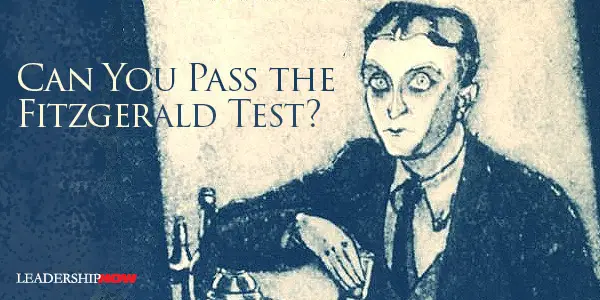
IN HIS CLASSIC self-analysis, The Crack-Up, F. Scott Fitzgerald wrote, “The test of a first-rate intelligence is the ability to hold two opposed ideas in the mind at the same time, and still retain the ability to function.” For example, he added, one should “be able to see that things are hopeless and yet be determined to make them otherwise.” More and more we are called upon to function in a world full of paradoxes; not only function but possess an ability to take action in the face of conflicting ideas and norms. Bruce Piasecki writes in The Surprising Solution, that paradox “almost seems too mild a word to describe the challenges facing the social leaders of today.” He adds, the best leaders “thrive on differences and ambiguity, and find solutions amid this large tolerance for social complexity.” In his innovation playbook for uncertain times, The Silver Lining, Scott Anthony writes, “Existing systems, structures, and development programs that were sufficient for leaders to thrive in an era of ordered capitalism are proving to be inadequate in today’s increasingly turbulent times. Most leaders just aren't ready to grapple with the paradoxes that will increasingly characterize their day-to-day lives.” He lists, for example, these seemingly paradoxical requirements facing leaders:
Anthony reports that it has been estimated that no more than 5 percent of the manager population can truly grapple with paradox. Why? He says that “Michael Putz from Cisco has studied this problem for the past decade. His perspective is that the problem isn’t a lack of basic intelligence, desire, or capacity. Rather, managers haven’t developed the ability to grapple with paradox because they haven’t needed to.” But the capacity to deal with paradox, to work with opposable ideas, is learnable. Again, self-awareness is key. Understand how you view the world. Then, creating a specific developmental program to help you take a broader view, to integrate multiple perspectives, to view solutions as both/and instead of either/or, will help you pass the Fitzgerald Test. 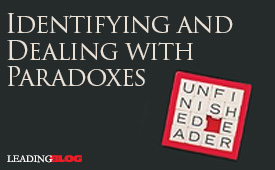 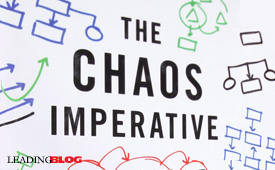
Posted by Michael McKinney at 12:12 AM
01.20.10

What Your Group Needs to Become ExtraordinaryWhy do most groups fall short of their potential and only a few groups become extraordinary? To find out Geoffrey Bellman and Kathleen Ryan say we need to dig deeper into the wants, needs and motives that cause people to work together. They define an extraordinary group as one that “achieves outstanding results while members experience a profound shift in how they see their world.” They exhibit:
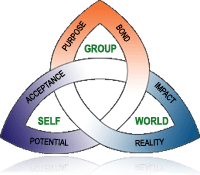
To accomplish this, you want to be a facilitative leader as opposed to a directive leader. With the group needs model in mind, the authors suggest that you “stand back from your group to consider the individual members, their collective purpose, and the world in which they operate” and ask “How might this group experience meet those needs?” Then consider the eight indicators of extraordinary groups (listed above) to see if they are present. Do members of the group seem energized, hopeful, connected and positively changed? A group leader needs to frame an inspiring purpose, lead with a light touch, keep the issues discussable, manage the world around the group acting as a buffer and facilitator, make sure the right people are on the team (those people with the knowledge, skills, or experience to tackle the group’s purpose), and integrate the Groups Model into their approach. Ask yourself questions like: “How will this meeting meet the needs of acceptance and potential, bond and purpose, reality and impact?” “Where and how can we use our differences as a group strength?” “Is there enough room in the agenda so that members have time for those more in-depth and sometimes complex conversations?” Extraordinary Groups offers practical advice on implementing the Groups Model into your own group situation. All of the suggestions offered are accompanied by examples, reflection questions and sample actions for both you and the group. By paying attention to group needs you can more consistently transform ordinary groups into something more energizing, connecting and affirming.
Posted by Michael McKinney at 12:02 AM
01.19.10

Leading Views: How To Increase Your Value In The Unforced Error, Jeffrey Krames is talking about taking responsibility. No Responsibility = No Value. Taking responsibility is about seeing the larger goals of the company and your part in it. It’s about learning to leader from where you are. To not take responsibility is to say “I don’t want to be part of the solution.” In fact, you become part of the problem. Kramer writes: In The Unforced Error, Jeffrey Krames is talking about taking responsibility. No Responsibility = No Value. Taking responsibility is about seeing the larger goals of the company and your part in it. It’s about learning to leader from where you are. To not take responsibility is to say “I don’t want to be part of the solution.” In fact, you become part of the problem. Kramer writes:
At Work, people often look at their jobs in terms of tasks rather than responsibilities. But if you don’t view responsibility in the broader sense, you may be committing the most subtle of unforced errors: Over time you may fall off the corporate radar screen. Your boss may feel that you are capable of completing a routine task or matter, but if the assignment is more than routine, or if the boss is looking for someone to take the initiative, she will not think of you. And when it comes time to promote someone or to draw up a list of the valuable people she needs to keep when corporate belt tightening requires a layoff, she will not think of you. If there is nobody addressing a problem that you observe, or taking advantage of an opportunity that you see, think about whether you should be doing it yourself. Taking responsibility is about developing a mind-set that says: “I am responsible for what happens in my unit. It’s my job to help get us to success.
Posted by Michael McKinney at 07:47 AM
01.18.10

Building a Community of High Commitment and High PerformanceIf the leaders of the financial institutions implicated in the economic crisis had had the aspirations, the higher moral purpose, or the savvy to build resilient organizations capable of sustained advantage, could we have avoided the financial crisis? Harvard’s Michael Beer thinks so. Leaders of high commitment, high performance organizations (HCHP) make principled choices. He argues in High commitment, High Performance, “These choices begin with their definition of firm purpose—a desire to make a positive contribution to customers, employees, and society.” If a leader’s “primary goal is to acquire money and power, building an HCHP organization will be beyond their reach.”To build enduring HCHP organizations, leaders must stick to the firm’s why: purpose and guiding values, strategy, risk profile, and basis for motivating, organizing, and managing people. “In times of crisis, when capital markets may demand expedient decisions that could take the firm off the HCHP path, commitment to principles enables CEOs to go against conventional wisdom in decisions about strategy, debt, growth rate, acquisitions, and layoffs.” These circumstances often create conflicting demands between people and profits that leaders must learn to integrate. This does not call for heroic leaders—single-minded and single-handed leaders—but leaders who are willing to listen and engage others in a collective action learning process. In a crisis we often look for saviors, but instead, writes Ron Heifetz in Leadership Without Easy Answers, “we should be calling for leadership that will challenge us to face problems for which there are no simple, painless solutions.” Heroic leadership isn’t about listening or collective learning. “Most important,” writes Beer, “heroic leadership fails to perform the central function of leadership—engaging employees authentically in a process of organizational learning and development from which they as leaders also learn.” Leading the creation of a HCHP organization is “not about aligning the company with the leader’s ideas. It is about enabling leaders and their people to learn together about the problems they face and the actions they must take.” Surviving and thriving in this crucible of conflicting demands is no easy task. It requires that leaders strengthen and develop their internal resources. They must learn to enter the fundamental state of leadership when faced with challenges—a state that demands that they dig deep into their values and purpose. That fundamental state of leadership requires leaders to move from comfort with activities to focus on results, from self-absorption to commitment to mission and higher purpose, from focus on self to focus on others, from being internally closed to being externally open, and from hiding the truth to embracing the truth.Incidentally, it will not come as a surprise to readers of the Leading Blog, that generally, underperforming companies have not developed leaders throughout their organizations. Beer suggests that this is because “most managers had come up through their home function, business unit, or region, and never acquired the broader general management perspective needed to understand and manage cross-boundary activities….In many of the companies, ineffective senior teams did not spend time developing common values and perspective about what constituted good leadership.” Again, the primary responsibility to learn to lead from where you are lies with you.
Posted by Michael McKinney at 12:02 AM
01.12.10

Thriving In the New EconomyWe have been going through the worst economy in three generations. It has been a defining moment for many leaders. While many of us have been focused on surviving, there have been those leaders that have thrived in this economy; leaders who have taken advantage of this changing economy and have found opportunities amid the uncertainty.Lori Ann LaRocco, Senior Talent Producer at CNBC and a producer of the show Squawk Box, was in a position to ask some of the best minds in business today how they are responding this economic environment, how they are defying failure and what opportunities do they see? As a result, LaRocco has assembled 23 insightful essays in Thriving In the New Economy. In their own words, they shed light on how they view the crisis, what they did as a result, and what they plan to do. It makes for a compelling read to gain a window on these leaders' different but similar viewpoints and approaches. The essays are divided into five sections: the economy, banking, real estate, autos, and retail. You will read personal accounts from people like economists Larry Lindsey and David Malpass; Wall Street legends Jack Bogle, Bob Doll, Abby Joseph Cohen, Ron Baron and Peter Cohen; bankers Kelly King, and Donald Powell; real estate executives Don Peebles Richard LeFrak, and Ron Peltier; and from the auto and retail industries Jim Lentz and Steve Sadove. Larry Lindsey, CEO of The Lindsey Group shares this on the function of leadership: “Most institutions prefer managers who will serve the needs of an existing institution—that is, who will follow the wishes of the various constituencies within the institution—rather than managers who will lead the institution to a new place." “Our political process is dominated by leaders who tell us what they think we want to hear, thereby effectively following the polls and the media and not necessarily leading the country…. But that type of leadership by itself can actually be a handicap for a society dealing with a financial or economic catastrophe. To be precise, financial crises throughout history have developed when excesses went unchecked. Like the over-leveraging of risk in our capital system. All these manias, panics, and bubbles have the same characteristic: the absence of real leadership that takes a contrarian perspective.” At Forbes, Steve Forbes says, “Essentially, we learned that in a down economy you have to both tighten your belt and plant seeds for the future, which is tough to do.” Peter Cohen founder of the $7.5 billion alternative asset management company Ramius, says you have to remain open and pay attention. “What I do know,” Cohen writes, “is you have to show up every day at work; you have to be there every day to find opportunity. You have to be constantly alert to what the possibilities are. Good ideas are all around all the time, if you’re paying attention.” He continues: I’ll take information wherever I get it and run it down. Winning is all about showing up. I know a lot of people who say they don’t want to go to work and claim to have nothing to do there. That’s not true. There is always something to do at work—always. That is a philosophy that I follow, and that we follow. And while I think we’re in for a really difficult time ahead, I’m really excited that there’ll be some great opportunities that will come out of it.Luck must play a part in all of this too. Thriving in the New Economy has no chapter 11. LaRocco says that when she began to assign chapters in the book, a lot of the authors asked her not to put them in “Chapter 11.” You can read (PDF) the contribution by Wilbur Ross on how he analyzes a crisis and how he chooses to invest.
Posted by Michael McKinney at 06:11 PM
01.06.10

Business Reputation Isn’t Just About BusinessPeter Firestein makes the claim that “reputation is the strongest determinant of any corporation’s sustainability.” It determines value and relationships.The corporate landscape has changed. Corporations don’t exist in a social vacuum. In Crisis in Character, Firestein writes, “the individuals who run significant companies hold much more than the companies themselves in their hands. Their influence extends to where the children of their employees can go to college, and whether the communities that surround them survive.” People look to corporations as they look to their politicians. They want corporations to reflect their own values. As a consequence, the question arises: Why should the conduct expected of corporations and individuals differ from each other? Why should we not hold both to the same standards? A corporation’s strong social identity can cast its light across products and services, and onto the attitudes of investors, legislators, regulators, and prospective business partners.All of this adds up to a greater reputation risk. Reputation goes deeper than a corporate press release. It’s embodied in the system and the people who run it. To help companies achieve a balance between their internal realities and the demands of investors and society, Firestein developed a set of seven strategies that are of immediate use:
The CEO must foster a company whose characteristics are such that its influencers assume both its good intentions and its fundamental ethics in all circumstances. Should a crisis occur, that company receives the benefit of the doubt during the crucial time it takes to investigate the oil spill, the factory explosion, or the defective product. It will already have earned the chance to tell its story before the adverse event takes place. That’s the most important characteristic of a good reputation. The history of corporate failings is laden with tales of companies that have arrived completely unprepared at moments of crisis. When did Noah build the ark? Before the rain.
Posted by Michael McKinney at 09:06 AM
01.05.10

Leading Views: Parker Palmer on Leading From Within
We have a long tradition of approaching leadership via the “power of positive thinking.” I want to counterbalance that approach by paying special attention to the tendency we have as leaders to project more shadow than light. Leadership is hard work for which one is regularly criticized and rarely rewarded, so it is understandable that we need to bolster ourselves with positive thoughts. But by failing to look at our shadows, we feed a dangerous delusion that leaders too often indulge: that our efforts are always well intended, our power is always benign, and the problem is always in those difficult people whom we are trying to lead.
Posted by Michael McKinney at 09:44 AM
01.04.10

The One Question You Should Ask Now
Why? WHY gets to the cause of things. The answer is your purpose or belief. It explains why you get up in the morning, why should I follow you, why should I buy from you. Your why is what inspires people. It gives clarity. Everything you do—your HOWs and WHATs—flows from your WHY. Why is vital to leaders. It inspires action through inspiration instead of manipulation. Simon Sinek, author of Start With Why, says, “To lead requires those who willingly follow. It requires those who believe in something bigger than a single issue.” He distinguishes between leaders in name and those who actually lead. The difference is the why. It is possible to motivate people by external factors like a tempting promotion or fear. General Motors, for the last 70 years, has been the leader in their industry, but for the most part, did not lead. Sinek explains: Great leaders, in contrast, are able to inspire people to act. Those who are able to inspire give people a sense of purpose or belonging that has little to do with any external incentive or benefit to be gained…. Those who are able to inspire will create a following of people—supporters, voters, customers, workers—who act for the good of the whole not because they have to, but because they want to. “People don’t buy WHAT you do, they buy WHY you do it.” The problem says Simon Sinek, “is most businesses today are making decisions based on a set of incomplete or, worse, completely flawed assumptions about what’s driving their business.” They don’t know or have forgotten the why. Whys are hard to communicate. It’s easier to talk about what you do or how you do it. So we focus on the whats and the hows and over time, the why can get lost. In Start With Why he introduces the Golden Circle to explain loyalty and how to create enough momentum to turn an idea into a social movement. It begins from the inside out. It starts with why.
"All great leaders have charisma because all great leaders have clarity of WHY; an undying belief in a purpose or cause bigger than themselves." Begin your year by asking WHY. Then communicate it through everything you do. Let WHY be the inspiration to your Hows and Whats. “Achievement comes,” says Sinek, “when you pursue and attain WHAT you want. Success comes when you are clear in pursuit of WHY you want it.” 
Posted by Michael McKinney at 03:02 PM
01.03.10

George Washington's Rules of Civility and Decent Behavior If you're considering some personal development goals you couldn't go wrong reviewing the 110 Rules of Civility & Decent Behavior once copied down by George Washington.  Today many, if not all of these rules, sound a little fussy if not downright silly. It would be easy to dismiss them as outdated and appropriate to a time of powdered wigs and quills, but they reflect a focus that is increasingly difficult to find. The rules have in common a focus on other people rather than the narrow focus of our own self-interests that we find so prevalent today. Fussy or not, they represent more than just manners. They are the small sacrifices that we should all be willing to make for the good of all and the sake of living together. Check them out at Foundations Magazine.
Posted by Michael McKinney at 09:11 AM
01.01.10

First Look: Leadership Books for January 2010Here's a look at some of the best leadership books to be released in January.




For bulk orders call 1-800-423-8273
Posted by Michael McKinney at 12:00 AM
|
BUILD YOUR KNOWLEDGE


How to Do Your Start-Up Right STRAIGHT TALK FOR START-UPS 
Grow Your Leadership Skills NEW AND UPCOMING LEADERSHIP BOOKS 
Leadership Minute BITE-SIZE CONCEPTS YOU CAN CHEW ON 
Classic Leadership Books BOOKS TO READ BEFORE YOU LEAD |
|